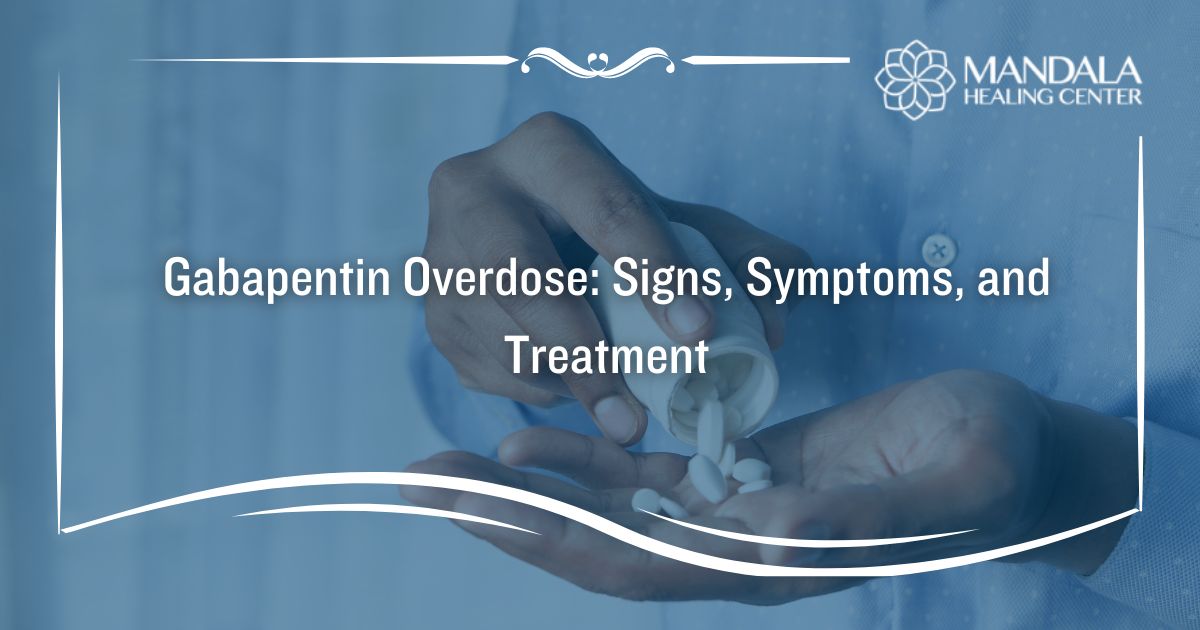Gabapentin is a nerve pain and anticonvulsant medication that can induce sedative effects. Doctors might use it to treat restless leg syndrome, seizures, and nerve pain.[1] As a central nervous system depressant, it can decrease your heart rate and blood pressure.
When used in high doses, gabapentin might cause mind-altering side effects. You might take more than you are prescribed to experience a high. It is also common to combine gabapentin with other substances like opioids to get high.
Whether you are taking gabapentin in large doses or mixing it with other drugs, you could experience a fatal overdose. If you are suffering from gabapentin addiction, you should seek help from an addiction treatment program before you accidentally consume too much at once.
Signs of a gabapentin overdose include slurred speech, vomiting, labored breathing, and coma. It is treated using various methods, including airway maintenance, supplemental oxygen, activated charcoal, and more.
In this article, you will learn:
- What are the effects of gabapentin?
- Can you overdose on gabapentin?
- What are the signs and symptoms of a gabapentin overdose?
- How is gabapentin overdose treated?
What are the Effects of Gabapentin?
Gabapentin is intended to be used to treat conditions like nerve pain and seizures. It is prescribed in controlled doses to ensure you do not experience mind-altering effects that could be habit-forming. If you take more than you are prescribed, you could become addicted to gabapentin.
The side effects of gabapentin may include:[1]
- Dizziness or drowsiness
- Tiredness and weakness
- Headaches
- Shaking or tremors
- Unsteadiness and coordination issues
- Anxiety or unusual thoughts
- Memory issues
- Nausea and vomiting
- Heartburn and dry mouth
- Constipation or diarrhea
- Increased appetite and weight gain
- Back or joint pain
The side effects of gabapentin should subside as your body adjusts to the medication. If they become severe or persist longer than a couple of weeks, you should seek advice from a medical professional.
Can You Overdose on Gabapentin?
If you begin abusing gabapentin, you will eventually develop an addiction. Over time, your body will become tolerant of the substance, which means you will have to take larger amounts of gabapentin to experience a high. This puts you at risk of experiencing a life-threatening overdose.
The maximum dose of gabapentin for adults is 2400 mg.[2] If you take any amount over this dose, you could experience an overdose.
It is also common to mix gabapentin with opioids to experience more intense effects. According to the Centers for Disease Control and Prevention (CDC), 85% to 90% of gabapentin overdose deaths involve an opioid.[3]
What are the Symptoms of a Gabapentin Overdose?
Gabapentin overdoses have lower rates of mortality than other drugs. That said, it is possible to die from a gabapentin overdose, especially if you combine it with another substance like opioids. Opioids will increase the potency of effects like respiratory depression.
The main symptoms of a gabapentin overdose include:[4]
- Dizziness and drowsiness
- Double vision
- Slurred speech
- Nausea and vomiting
- Diarrhea
- Loss of coordination or ataxia
- Low blood pressure
- Rapid heart rate
- Labored breathing
- Coma
If you believe someone is experiencing a gabapentin overdose, seek emergency medical attention immediately. Overdose symptoms could include gurgling noises or a blue tint to lips and fingernails if opioids were involved.
How is Gabapentin Overdose Treated?
The first step in receiving treatment for a gabapentin overdose is to contact 911. Emergency medical professionals will assess you to determine if you are stable enough to be transported to the hospital. During the ambulance ride, you will be given fluids and the EMTs will make sure your airway remains open while you are hooked up to oxygen.
If you are unable to breathe, you will receive airway maintenance, supplemental oxygen, and possibly ventilation assistance.
If your airway is clear and breathing, you will be given activated charcoal. This substance induces vomiting and clears the gabapentin from your system.
In severe cases, gabapentin overdose can lead to a coma. In this case, you would receive support and assistance that keeps you stable during your coma. You will be assessed to determine if it is likely that you will overcome the coma.
Once you have been treated for your gabapentin overdose, medical professionals will likely refer you to an addiction treatment program. You might require a medical detox to overcome withdrawal symptoms or be able to immediately transfer into an inpatient or outpatient rehab center. If you have a co-occurring mental health condition, you will be referred to a dual-diagnosis rehab program.
Find Help for Gabapentin Abuse and Addiction
If you or a loved one suffers from gabapentin addiction, it’s time to seek help. At the Mandala Healing Center, we offer evidence-based treatments to help our clients regain control over their lives.
Contact us today for more information on our gabapentin addiction treatment program.
References:
- Medline Plus: Gabapentin
- The Food and Drug Administration (FDA): Neurontin Label
- The Centers for Disease Control and Prevention (CDC): Trends in Gabapentin Detection and Involvement in Drug Overdose Deaths — 23 States and the District of Columbia, 2019–2020
- Jama Network: Gabapentin Increasingly Implicated in Overdose Deaths












